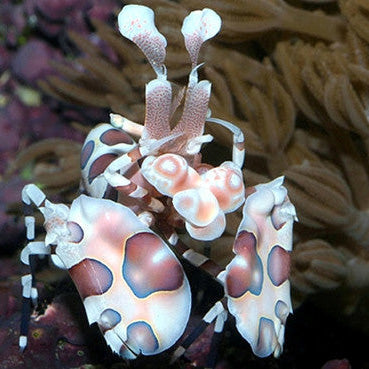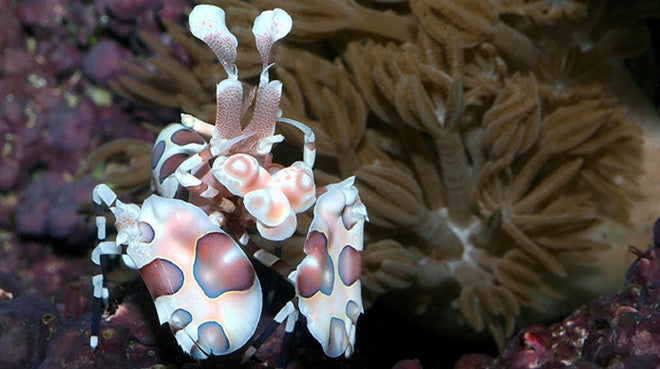40% Off Most Coral Frags - Just add to cart
Free Shipping Over $249 or $29.99 for Orders over $100
Harlequin Shrimp
$ 64.99
Please select all options.
How to Care for Harlequin Shrimp
written by Dave Burr
The Harlequin Shrimp feeds almost exclusively on starfish and is especially useful in ridding your aquarium of the parasitic Asterina Starfish. It requires only one larger starfish per month to maintain proper health. When kept in aquariums with infestations of small starfish additional feeding is usually not required.
Predators: Triggers, Larger Hawkfish, Groupers, Lionfish, and large predatory wrasses may eat Harlequin Shrimp. House larger shrimp with smaller fish to help even the odds if housing with these types of fish.
Feeding: Offer the Harlequin Shrimp starfish to feed on. It will feed on the parasitic Asterina Starfish and many others.
Growth: Maintaining proper pH, Ca, Alk, & Mg levels is important for Harlequin Shrimp. Providing additions of iodine will help the Harlequin Shrimp to molt and grow.
Acclimation: Take the time to do a drip acclimation with any shrimp as they do not tolerate rapid changes in water chemistry very well.
Care Level: Easy
Reef Compatible: Yes
Diet: Carnivore
Range: Indo-Pacific, Indian Ocean
Family: Gnathophylidae
Water Conditions: 75-80° F; sg 1.024-1.026 (1.025 is ideal); pH 8.1-8.4 Ca 420-440 ppm, Alk 8-9.5 dKH, Mg 1260-1350, Nitrates <10ppm, Phosphates < .10ppm
Water Chemistry: It is important that proper calcium (420-440 ppm), alkalinity (8-9.5 dkh - run it 7-8 if you are carbon dosing) , and magnesium levels (1260-1350 ppm) are maintained. Raising magnesium levels gradually up to 1400-1600 ppm can help to combat algae outbreaks, just keep CA and Alk in line as you raise the Mg. Nitrates should be below 10 ppm and phosphates should be below .10 ppm. We recommend doing a water change when Nitrate levels rise to 10 ppm. It is important to replace your phosphate media when phosphates rise to .10 ppm. Media Reactors make the most efficient use of your phosphate media by fluidizing it.
Dosing: Vivid Aquariums uses and recommends dosing pumps to automate the dosing of additives and keep your levels more constant. A dosing pump can alleviate the chore of manually dosing your aquarium with Ca, Alk, & Mg 2,3, or 4 times per week and will benefit your aquarium by keeping your levels constant through frequent small additions of Ca, Alk, & Mg. Our tanks all progressed when we switched from 3 manual dosings per week to 70 automatic dosings per week and we got a lot more work done.
Video
Category: 50-75, carnivore, Clean Up Crew, hymenocera-elegans, Shrimp
Type: Invert



